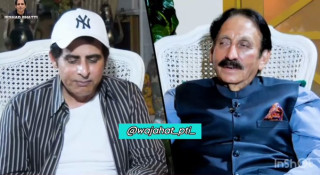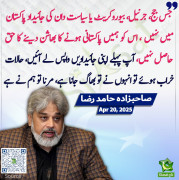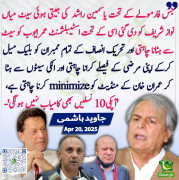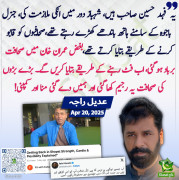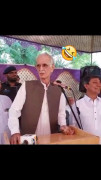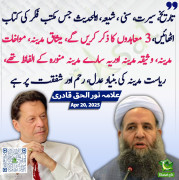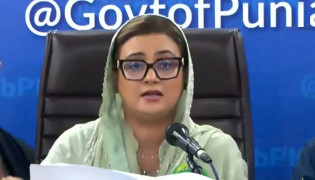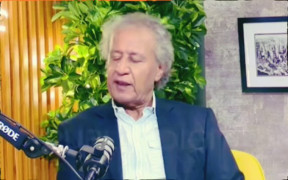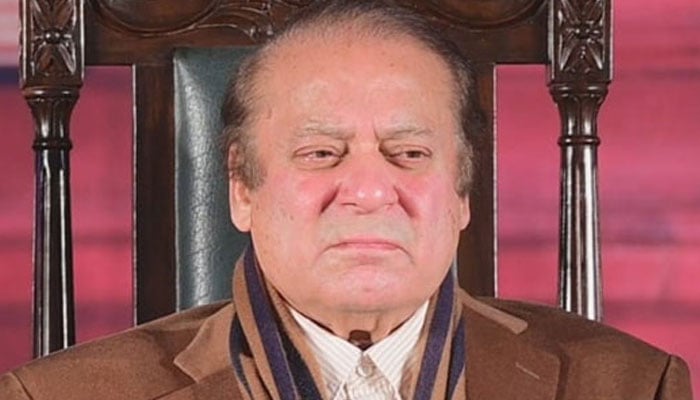BlackRock
MPA (400+ posts)
(The word Indian used anywhere in this text refers to all the people living in pre-partition India or the sub-continent)
Unity of differences:
We lost the American colonies because we lacked the
statesmanship to know the right time and the manner
of yielding what is impossible to keep.
HM Elizabeth II
In times gone by, when there were no hotels, motels or guest houses, people in traditionally strong trading and traveling nations sometimes did come across situations when one traveled from point A to point B and the travel required more than a single day of horse or camel ride. Usually and normally what these people did was that upon reaching any village or populated zone by the evening, they would knock at any door and would ask for permission to stay over night. Such unexpected guests were always welcome and people seldom very seldom refused to host travelers.
When I say strong trading and traveling nations I mean people from Eastern civilizations such as China, India, and Central Asia etc. etc. I think its needless to tell that travel and trade were highly developed in the said regions at times when inhabitants of Western hemisphere, mainly modern day Europe, were still living in caves.
So it wont be an exaggeration to say that since times unregistered in history, people of above mentioned Eastern countries were way ahead of other inhabitants of planet earth when it came to international relations, traditions, culture and all together civilization. People of these countries or territories were historically and culturally very hospitable, forthcoming and generous.
In the meantime, a little more than a couple of thousand years ago, inhabitants of the West exited their caves and started exploring that the world is a little bigger than their cave and immediate vicinity. Unfortunately since the Western people had no history to look into or any genetic trace of civilization, their explorations started out and continued according to the law of the jungle: You kill or be killed.
With such developed animal instincts people of the West started their exploration and had no time to sit down and even consider that maybe just maybe there was something more than KILL OR BE KILLED to life.
The Western herd, after internal sampling and extinction of the weakest, gathered into a group of morally and culturally very weak gang.
The people in the East in the meanwhile kept on developing their human culture and in the quest for reaching the heights of generosity killed their instincts. When the guests from the West arrived and knocked at the generous Eastern door, they were welcomed and hosted with honor. The result of such hospitality was an aftermath that we today know as COLONIALISM.
The Indian Empire pre Western colonization was so vast that none of the colonizers could single handedly control it. India was mainly colonized by the British (East India Company was nothing more than a cover-up and intelligence structure developed by misusing the hospitality and generosity of the then rulers.).
Even in the 18th century, the Western colonizers had nothing in their mind except for the same law of the jungle. They came to India with developed weapons and empty souls. For the British colonizers India was nothing more than a resource rich piece of land, inhabited by people whose cultural traits went beyond the times imaginable. The British in fact had that strong inferiority complex when they got in contact with the locals. As they, the British thought they were powerful, but the locals as per British standards, even being weaker were happy, proud and generous. The Indian ruler who opened Indias doors to East India Company once again demonstrated the same Indian generosity allowing a foreign company to engage in business. Had he known what it would turn into, probably he wouldnt have done that.
The British colonizers did the same in India as the conquistadores did in Latin America: Looted the land and set off on extermination of local population. When the local people understood and started resisting the intruders free will they were labeled as traitors, terrorists and fanatics.
The first organized resistance to the British intrusion started in 1856. The British Crown supported the East India Company in suppressing the resistance and at the end of the day according to some sources exterminated more than 10 million local people. According to other sources the numbers were in hundreds of thousands. The important thing is not the exact numbers. The important thing is the treatment or handling of the situation. Looking at the 1857 revolt in detail you can understand for yourself how deeply rooted was and still is the law of the jungle in the Western mind.
A letter published after the fall of Delhi in the "Bombay Telegraph" and reproduced in the British press testified to the scale and nature of the retaliation:
.... All the city people found within the walls (of the city of Delhi) when our(British) troops entered were bayoneted on the spot, and the number was considerable, as you may suppose, when I tell you that in some houses forty and fifty people were hiding. These were not mutineers but residents of the city, who trusted to our well-known mild rule for pardon. I am glad to say they were disappointed.
Another brief letter from General Montgomery to Captain Hodson, the conqueror of Delhi exposes how the British military high command approved of the cold blooded massacre of Delhites: "All honour to you for catching the king and slaying his sons. I hope you will bag many more!"
Another comment on the conduct of the British soldiers after the fall of Delhi is of Captain Hodson himself in his book, Twelve years in India: "With all my love for the army, I must confess, the conduct of professed Christians, on this occasion, was one of the most humiliating facts connected with the siege."
Edward Vibart, a 19-year-old officer, also recorded his experience:
It was literally murder... I have seen many bloody and awful sights lately but such a one as I witnessed yesterday I pray I never see again. The women were all spared but their screams on seeing their husbands and sons butchered, were most painful... Heaven knows I feel no pity, but when some old grey bearded man is brought and shot before your very eyes, hard must be that man's heart I think who can look on with indifference...
Some British troops adopted a policy of "no prisoners". One officer, Thomas Lowe, remembered how on one occasion his unit had taken 76 prisoners - they were just too tired to carry on killing and needed a rest, he recalled. Later, after a quick trial, the prisoners were lined up with a British soldier standing a couple of yards in front of them. On the order "fire", they were all simultaneously shot, "swept... from their earthly existence". This was not the only mass execution Lowe participated in: on another occasion his unit took 149 prisoners, and they were lined up and simultaneously shot.
As a result, the end of the war was followed by the execution of a vast majority of combatants from the Indian side as well as large numbers of civilians perceived to be sympathetic to the rebel cause.
The British press and government did not advocate clemency of any kind, though Governor General Canning tried to be sympathetic to native sensibilities, earning the scornful sobriquet "Clemency Canning".
Soldiers took very few prisoners and often executed them later.
The popular poet Martin Tupper - "in a ferment of indignation" - played a major part in shaping the public's response. His poems, filled with calls for the razing of Delhi and the erection of "groves of gibbets" are telling:
And England, now avenge their wrongs by vengeance deep and dire,
Cut out their canker with the sword, and burn it out with fire;
Destroy those traitor regions, hang every pariah hound,
And hunt them down to death, in all hills and cities round.
Well the true British face was shown by renowned progressive writer Charles Dickens. The December 1857 issue of Charles Dickens' Household Words contained an essay by Dickens and Willkie Collins in which Dickens says, in words that are emblematic of the middle Victorian imperialism:
"I wish I were a commander in chief in India. The first thing I would do to strike that Oriental Race with amazement....should be to proclaim to them that my holding that appointment by the leave of God, to mean that I should do my utmost to exterminate the race upon whom the stain of the late cruelties rested; and that I was there for that purpose and no other, ...now proceeding, with all convenient dispatch and merciful swiftness of execution, to blot it out of mankind and raze it off the face of the Earth."
Brave Indian patriots were tied to cannons and blown away or were hung to death in huge numbers. The ironic fact is that courageous Indian fighters were labeled as traitors of the British crown, mutineers and criminals. Well I try not to laugh, but believe me its hard to hold back. Consider a situation when a robber enters your home. If you resist or attempt to resist the criminal element that robber goes and asks for you to be tried for maltreatment! Thats exactly what happened in India. The struggle against invaders, looters and royal criminals was labeled as mutiny, revolt or treason. Dont hold back your laughter!
If you ask anyone today, they would say that the British didnt only rob India, they brought a lot of good things as well, for example the railways. But my dear reader do you know that the railway was built not to ease the peoples lives. It was a faster mode of transporting troops inland and transporting Indian riches out to the port cities from where they were shipped to THE BRITISH ISLES. The British museum is still laden with looted from India Materials and its needless to point out individual things like the Kohinoor. The colonizers constructed buildings not to solve the residential needs of the local public but to house their own robbers and killers in uniforms and ties, because they needed such comfort to sit and plot divisions among the local people.
A few days ago, while watching a TV program, I heard a British citizen say that among a lot of other positive and beneficial things that British colonizers did, they brought English language and English medium of education to India, which today is the best reason why Indians (pre partition I mean) are able to work in the software industry and do have access to great opportunities.
I would bring up an example to counter this. Russia was never colonized by the British and they didnt bring English language to the Russian people. Why then there are more Russian Nobel prize winners than Indians? How could Russians and Chinese out smart everyone else technologically? Or is it that their progress means nothing because it was not done in English? How nave and stupid is the person who believes that English language is a gift of the British colonizers to the people of India, agreed? By the way Sweden was never colonized by the British, but nearly everyone in Sweden speaks English.
What really the colonizers brought to the people of India was humiliation, poverty, disgrace and religious, ethnic and linguistic conflicts.
India had always been a multi racial, multi cultural and multi religious domain. The versatility in Indian cuisine is the first indicator of unity of differences. Versatility of architecture is the second indicator and then comes the dress and so on and so forth. Hindu mandirs, Muslim mosques and Sikh gurudwaras, always existed alongside each others. People always respected each others faith and celebrated all festivals together. Apart from religious festivals Indians had a lot of social or cultural festivities such as basant, which brought together people with religious differences as a single nation.
Strangely enough in pre-colonial India, Hindus and Muslim (and all other faiths as well) did debate differences, but never killed each other. People in India new a magical word and practiced it. The word was co-existence. Since Indians, unlike the colonizers had a great, long and rich history and had gone far ahead in their process of human progress, they had understood that differences meant development and that conflicts can and should be resolved and that killing was not the answer. Thats why Indians lived and prospered in a very diverse social set-up.
What the British colonizers brought to India was a mockery of a civilization. Why mockery of a civilization?
Because a mindset, which advocates, that war is the wheel of progress can produce anything, but a CIVILIZATION. The British explored and exploited differences. They undermined thousands of years of social harmony. Shortly speaking they divided and ruled. The Indian empire was split up, millions of people were unjustly murdered, the country was robbed to the last thread and shamelessly enough the British still assert that they brought prosperity to India.
Its time to wake-up. I think instead of dancing to the Western fiddle, the people of the sub-continent, should work together to undo the damage done by the pea brained colonizers.
And if the colonizers have really learnt something human by now, I think its time for her majesty Elizabeth II the queen of England to say sorry to the families of those Brave Indian patriots, who were illegally tried and convicted of treason. Say sorry to the people of the sub-continent for hindering in the way to their progress and for stealing their livelihood.
K.R.Ali.
Unity of differences:
We lost the American colonies because we lacked the
statesmanship to know the right time and the manner
of yielding what is impossible to keep.
HM Elizabeth II
In times gone by, when there were no hotels, motels or guest houses, people in traditionally strong trading and traveling nations sometimes did come across situations when one traveled from point A to point B and the travel required more than a single day of horse or camel ride. Usually and normally what these people did was that upon reaching any village or populated zone by the evening, they would knock at any door and would ask for permission to stay over night. Such unexpected guests were always welcome and people seldom very seldom refused to host travelers.
When I say strong trading and traveling nations I mean people from Eastern civilizations such as China, India, and Central Asia etc. etc. I think its needless to tell that travel and trade were highly developed in the said regions at times when inhabitants of Western hemisphere, mainly modern day Europe, were still living in caves.
So it wont be an exaggeration to say that since times unregistered in history, people of above mentioned Eastern countries were way ahead of other inhabitants of planet earth when it came to international relations, traditions, culture and all together civilization. People of these countries or territories were historically and culturally very hospitable, forthcoming and generous.
In the meantime, a little more than a couple of thousand years ago, inhabitants of the West exited their caves and started exploring that the world is a little bigger than their cave and immediate vicinity. Unfortunately since the Western people had no history to look into or any genetic trace of civilization, their explorations started out and continued according to the law of the jungle: You kill or be killed.
With such developed animal instincts people of the West started their exploration and had no time to sit down and even consider that maybe just maybe there was something more than KILL OR BE KILLED to life.
The Western herd, after internal sampling and extinction of the weakest, gathered into a group of morally and culturally very weak gang.
The people in the East in the meanwhile kept on developing their human culture and in the quest for reaching the heights of generosity killed their instincts. When the guests from the West arrived and knocked at the generous Eastern door, they were welcomed and hosted with honor. The result of such hospitality was an aftermath that we today know as COLONIALISM.
The Indian Empire pre Western colonization was so vast that none of the colonizers could single handedly control it. India was mainly colonized by the British (East India Company was nothing more than a cover-up and intelligence structure developed by misusing the hospitality and generosity of the then rulers.).
Even in the 18th century, the Western colonizers had nothing in their mind except for the same law of the jungle. They came to India with developed weapons and empty souls. For the British colonizers India was nothing more than a resource rich piece of land, inhabited by people whose cultural traits went beyond the times imaginable. The British in fact had that strong inferiority complex when they got in contact with the locals. As they, the British thought they were powerful, but the locals as per British standards, even being weaker were happy, proud and generous. The Indian ruler who opened Indias doors to East India Company once again demonstrated the same Indian generosity allowing a foreign company to engage in business. Had he known what it would turn into, probably he wouldnt have done that.
The British colonizers did the same in India as the conquistadores did in Latin America: Looted the land and set off on extermination of local population. When the local people understood and started resisting the intruders free will they were labeled as traitors, terrorists and fanatics.
The first organized resistance to the British intrusion started in 1856. The British Crown supported the East India Company in suppressing the resistance and at the end of the day according to some sources exterminated more than 10 million local people. According to other sources the numbers were in hundreds of thousands. The important thing is not the exact numbers. The important thing is the treatment or handling of the situation. Looking at the 1857 revolt in detail you can understand for yourself how deeply rooted was and still is the law of the jungle in the Western mind.
A letter published after the fall of Delhi in the "Bombay Telegraph" and reproduced in the British press testified to the scale and nature of the retaliation:
.... All the city people found within the walls (of the city of Delhi) when our(British) troops entered were bayoneted on the spot, and the number was considerable, as you may suppose, when I tell you that in some houses forty and fifty people were hiding. These were not mutineers but residents of the city, who trusted to our well-known mild rule for pardon. I am glad to say they were disappointed.
Another brief letter from General Montgomery to Captain Hodson, the conqueror of Delhi exposes how the British military high command approved of the cold blooded massacre of Delhites: "All honour to you for catching the king and slaying his sons. I hope you will bag many more!"
Another comment on the conduct of the British soldiers after the fall of Delhi is of Captain Hodson himself in his book, Twelve years in India: "With all my love for the army, I must confess, the conduct of professed Christians, on this occasion, was one of the most humiliating facts connected with the siege."
Edward Vibart, a 19-year-old officer, also recorded his experience:
It was literally murder... I have seen many bloody and awful sights lately but such a one as I witnessed yesterday I pray I never see again. The women were all spared but their screams on seeing their husbands and sons butchered, were most painful... Heaven knows I feel no pity, but when some old grey bearded man is brought and shot before your very eyes, hard must be that man's heart I think who can look on with indifference...
Some British troops adopted a policy of "no prisoners". One officer, Thomas Lowe, remembered how on one occasion his unit had taken 76 prisoners - they were just too tired to carry on killing and needed a rest, he recalled. Later, after a quick trial, the prisoners were lined up with a British soldier standing a couple of yards in front of them. On the order "fire", they were all simultaneously shot, "swept... from their earthly existence". This was not the only mass execution Lowe participated in: on another occasion his unit took 149 prisoners, and they were lined up and simultaneously shot.
As a result, the end of the war was followed by the execution of a vast majority of combatants from the Indian side as well as large numbers of civilians perceived to be sympathetic to the rebel cause.
The British press and government did not advocate clemency of any kind, though Governor General Canning tried to be sympathetic to native sensibilities, earning the scornful sobriquet "Clemency Canning".
Soldiers took very few prisoners and often executed them later.
The popular poet Martin Tupper - "in a ferment of indignation" - played a major part in shaping the public's response. His poems, filled with calls for the razing of Delhi and the erection of "groves of gibbets" are telling:
And England, now avenge their wrongs by vengeance deep and dire,
Cut out their canker with the sword, and burn it out with fire;
Destroy those traitor regions, hang every pariah hound,
And hunt them down to death, in all hills and cities round.
Well the true British face was shown by renowned progressive writer Charles Dickens. The December 1857 issue of Charles Dickens' Household Words contained an essay by Dickens and Willkie Collins in which Dickens says, in words that are emblematic of the middle Victorian imperialism:
"I wish I were a commander in chief in India. The first thing I would do to strike that Oriental Race with amazement....should be to proclaim to them that my holding that appointment by the leave of God, to mean that I should do my utmost to exterminate the race upon whom the stain of the late cruelties rested; and that I was there for that purpose and no other, ...now proceeding, with all convenient dispatch and merciful swiftness of execution, to blot it out of mankind and raze it off the face of the Earth."
Brave Indian patriots were tied to cannons and blown away or were hung to death in huge numbers. The ironic fact is that courageous Indian fighters were labeled as traitors of the British crown, mutineers and criminals. Well I try not to laugh, but believe me its hard to hold back. Consider a situation when a robber enters your home. If you resist or attempt to resist the criminal element that robber goes and asks for you to be tried for maltreatment! Thats exactly what happened in India. The struggle against invaders, looters and royal criminals was labeled as mutiny, revolt or treason. Dont hold back your laughter!
If you ask anyone today, they would say that the British didnt only rob India, they brought a lot of good things as well, for example the railways. But my dear reader do you know that the railway was built not to ease the peoples lives. It was a faster mode of transporting troops inland and transporting Indian riches out to the port cities from where they were shipped to THE BRITISH ISLES. The British museum is still laden with looted from India Materials and its needless to point out individual things like the Kohinoor. The colonizers constructed buildings not to solve the residential needs of the local public but to house their own robbers and killers in uniforms and ties, because they needed such comfort to sit and plot divisions among the local people.
A few days ago, while watching a TV program, I heard a British citizen say that among a lot of other positive and beneficial things that British colonizers did, they brought English language and English medium of education to India, which today is the best reason why Indians (pre partition I mean) are able to work in the software industry and do have access to great opportunities.
I would bring up an example to counter this. Russia was never colonized by the British and they didnt bring English language to the Russian people. Why then there are more Russian Nobel prize winners than Indians? How could Russians and Chinese out smart everyone else technologically? Or is it that their progress means nothing because it was not done in English? How nave and stupid is the person who believes that English language is a gift of the British colonizers to the people of India, agreed? By the way Sweden was never colonized by the British, but nearly everyone in Sweden speaks English.
What really the colonizers brought to the people of India was humiliation, poverty, disgrace and religious, ethnic and linguistic conflicts.
India had always been a multi racial, multi cultural and multi religious domain. The versatility in Indian cuisine is the first indicator of unity of differences. Versatility of architecture is the second indicator and then comes the dress and so on and so forth. Hindu mandirs, Muslim mosques and Sikh gurudwaras, always existed alongside each others. People always respected each others faith and celebrated all festivals together. Apart from religious festivals Indians had a lot of social or cultural festivities such as basant, which brought together people with religious differences as a single nation.
Strangely enough in pre-colonial India, Hindus and Muslim (and all other faiths as well) did debate differences, but never killed each other. People in India new a magical word and practiced it. The word was co-existence. Since Indians, unlike the colonizers had a great, long and rich history and had gone far ahead in their process of human progress, they had understood that differences meant development and that conflicts can and should be resolved and that killing was not the answer. Thats why Indians lived and prospered in a very diverse social set-up.
What the British colonizers brought to India was a mockery of a civilization. Why mockery of a civilization?
Because a mindset, which advocates, that war is the wheel of progress can produce anything, but a CIVILIZATION. The British explored and exploited differences. They undermined thousands of years of social harmony. Shortly speaking they divided and ruled. The Indian empire was split up, millions of people were unjustly murdered, the country was robbed to the last thread and shamelessly enough the British still assert that they brought prosperity to India.
Its time to wake-up. I think instead of dancing to the Western fiddle, the people of the sub-continent, should work together to undo the damage done by the pea brained colonizers.
And if the colonizers have really learnt something human by now, I think its time for her majesty Elizabeth II the queen of England to say sorry to the families of those Brave Indian patriots, who were illegally tried and convicted of treason. Say sorry to the people of the sub-continent for hindering in the way to their progress and for stealing their livelihood.
K.R.Ali.

